Bishops

I met my wife, Joy Carroll, at Greenbelt, a summer festival of faith, arts, and justice held annually in England. It was August 1994. A few months earlier, in May, Joy was one of the first women to be ordained as a priest in the Church of England. We were both speakers on a panel one day at Greenbelt, in a tent with 5,000 young people. Afterwards, we met for coffee. Joy had been an ordained deacon in the church for six years and was a leader in the movement to recognize all the gifts women had to offer both to the church and the parishes they served. She was the youngest member of the General Synod that decided to ordain women, and she was there for the historic vote in Church House Westminster in London. That cup of coffee eventually led to our marriage in 1997.
I have a vivid memory of returning to Greenbelt as speakers in 2002 with our almost 4-year-old son Luke. It was Sunday morning, and Joy was up on the worship platform celebrating the Eucharist for 20,000 people. My little boy was sitting on my lap watching his mom lead worship up on the stage. Luke looked up at me and said, “Daddy, can men do that too?”

CANTERBURY, England — Women’s rights activists greeted with delight signs the Church of England is poised to relent and allow women to be consecrated as bishops.
Archbishop of Canterbury Justin Welby will preside over a historic General Synod meeting at the University of York when a make-or-break vote on the subject is expected July 14.
“I think we’re there at long last,” American-born Christina Rees, one of the church’s leading women’s rights campaigners, said in an interview Thursday.

In another strongly worded message to the Catholic hierarchy, Pope Francis on Thursday told the Vatican body that vets nominees for bishops that they need to find him better candidates to send to dioceses around the world.
“To choose such ministers we all need to raise our sights, to move to a higher level,” Francis told the Congregation for Bishops, the critical department of the Roman Curia that acts as a clearinghouse for bishop nominees. “We can’t do anything less, and we can’t be content with the bare minimum.”
On consecutive days last weekend, Francis delivered stern warnings to 19 new cardinals he appointed to join about 150 others in the College of Cardinals: On Saturday, he told them to avoid “rivalry, jealousy, factions,” and at a Mass in the Vatican on Sunday, he said they must reject “habits and ways of acting typical of a court: intrigue, gossip, cliques, favoritism, and preferences.”
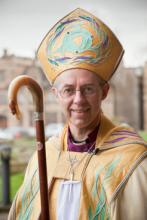
CANTERBURY, England — The Church of England’s governing body reaffirmed its commitment to consecrate women bishops with the aim of reaching final approval on an issue that has for so long split the church’s ranks no later than November 2015.
Meeting in York July 5-9, the General Synod agreed to consider new draft legislation by November this year.
This is the first time synod members have met since November 2012, when to the surprise of most of the British public, draft legislation to create women bishops narrowly failed to secure the requisite majority.
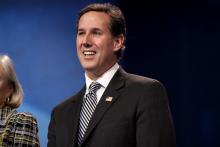
It’s not the message you might expect to hear from Rick Santorum, the Christian-conservative former presidential candidate: Faith-based films tend to be lousy, and Christians should quit trying to lock modern popular culture out of their lives.
Instead, Santorum says, Christian conservatives should acknowledge that modern popular culture is here to stay, and use that platform to produce Christian-themed films that will also have quality and popular appeal. It’s a strategy he says he intends to pursue in his new role as CEO of a ground-breaking faith-based film studio.
In an interview here, Santorum also stood by his strong views against same-sex marriage, citing the necessity to adhere to religious teachings — but then disputed his own religion’s leaders on the issue of immigration.

Pope Benedict XVI’s sudden announcement that he would resign by the end of the month took the church and the world by surprise, in large part because it was a move without precedent in the modern world.
But what comes next is as old and familiar as the papacy itself: Speculating about who will succeed to the Throne of St. Peter.
Indeed, within months of Benedict’s own election in 2005, church insiders and online oddsmakers were trying to figure out who might be next, given that Benedict — now 85 — was already aging, increasingly frail, and had himself declared that he did not expect his reign to be a long one.
So what will happen when the world’s cardinals gather before the splendor of Michelangelo’s Last Judgment fresco in the Sistine Chapel to elect a new pope? Who are the “papabile,” as the Italians say, the “pope-able” cardinals?
Will the conclave make the epochal break with the European monopoly and pick a cardinal from Latin America or Africa? The Catholic Church is booming in the Southern Hemisphere, as opposed to Europe and North America, where it is on life-support or barely treading water.
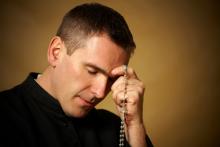
CANTERBURY, England — The Church of England on Jan. 4 confirmed that it has dropped its prohibition on gay clergy in civil partnerships becoming bishops — but only if they agree to remain celibate.
Speaking on behalf of the Church’s House of Bishops, Bishop of Norwich Graham Jones said in a statement: “The House of Bishops has confirmed that clergy in civil partnerships, and living in accordance with the teaching of the Church on human sexuality, can be considered as candidates for the episcopate. There had been a moratorium on such candidates for the past year and a half while the working party completed its task.”
Jones added that the bishops agreed it would be “unjust” to exclude gay men from becoming bishops if they were otherwise “seeking to live fully in conformity with the Church’s teaching on sexual ethics or other areas of personal life and discipline.”
On Monday, three West Virginia bishops joined by families and advocates pressed the state's politicians to protect poor and working families — or, in other words, the “least of these” — during budget battles in Washington.
The budget and tax negotiations are complex and important. They're driven in large part by the expiring Bush tax cuts and steep across-the-board spending cuts set to kick in if Congress does not act.
Congressional Republicans have been demanding deep spending cuts in programs, including Medicaid and Social Security. They've also defended tax cuts for the wealthy. A number of religious figures say those priorities are backwards.
Felicia Thomas, 24, director at Fort Hill Child Development Center, spoke at the meeting. Thomas is a single mother of a five year old little girl. Federal programs like Earned Income Tax Credit and child care subsidies have allowed Thomas not only to pursue her dreams of a better future, but also to keep the lights on and the fridge stocked.
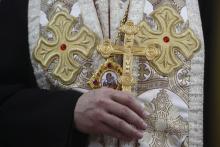
FATHER JACK MORRIS was one of those Catholic priests who ruined a lot of people for life. I'm one of them.
Father Morris passed away Sept. 30 in Spokane, Wash. He was working with the Catholic sisters and others who ran the highly regarded Copper Valley School in Alaska in the late 1950s when he took the idea of young people volunteering their time with and for Native Alaskans and helped turn it into the Jesuit Volunteer Corps. Since then, more than 12,000 people have served in the JVC, whose motto "ruined for life" reflects the fact that voluntary service often makes enduring changes in the way participants view the world. (A few years ago, Father Morris told Sojourners that the motto is "a resurrection statement"—through volunteering, he said, "you're transformed.")
I spent my first two years after college as a Jesuit Volunteer, first at the Oregon Center for Peace and Justice in Portland and then at Georgetown University's Center for Peace Studies. My mentor and boss in Portland was the center's director, Sister Michele Phiffer. She worked for years helping Catholics in Oregon understand the church's social teaching on the common good and the preferential option for people who are poor.
Perhaps needless to say, the local bishops weren't always on her side. In fact, it often appeared—even to my young eyes—that the bishops were more interested in protecting their own privilege and power than in genuinely working for the marginalized. And Sister Michele's gender seemed to be a factor in the lack of support she received from the episcopal powers that were.
RICHARD VIGUERIE is as responsible as anyone for the success of the conservative movement in this country. A pioneer in political direct mail, Viguerie has been involved from the radical edges of the Right in every Republican campaign from Goldwater to Romney; he's been called the "funding father of the conservative movement." He helped start hundreds of entities from Conservative Digest to Gun Owners of America, from the National Conservative Political Action Committee to the Moral Majority—spanning the political spectrum from Right to Far Right. Just before the 2012 election, he launched MyOwnSuperPAC because of "frustration at how weak and ineffective the Romney campaign's ads have been with its soft approach to Barack Obama—hardly ever mentioning Obama's radical, neo-Marxist vision for America's future," and insisting that "Obama is NOT failing. He's succeeding at doing exactly what he set out to do—and that's destroy capitalism and destroy the America you and I grew up in." So no one is going to mistake Viguerie for a squishy liberal.
And yet Viguerie's Catholic faith has led him to a surprising position on the issues of capital punishment and prison reform. The conservative icon talked with Sojourners editor-in-chief Jim Wallis in September about why he thinks an unexpected Left-Right alliance might turn the tide against the death penalty.
Jim Wallis: As you and I both know, we're often stuck in political straitjackets. There are issues that we could work together on, particularly as people of faith, that would help politicians do better than they sometimes do. I'd like to start with this: You've said that, as a Catholic, you're against the death penalty. Why is your faith as a Catholic central to this, and how has that turned you against the death penalty?
Richard Viguerie: My own road to Damascus on this issue came many years ago. When I was a young Republican in Houston in the late '50s and early '60s, I was a very hard-core, law-and-order type: "lock 'em up, throw the key under the jail so they never get out." In those days, law enforcement agencies were kind of immune from criticism. Over a period of time, I and many other conservatives have been disabused of the fact that people in law enforcement are above any mistakes or abuse of power.
BALTIMORE — A divided Catholic hierarchy on Tuesday failed to agree on a statement about the economy after a debate that revealed sharp differences over the kind of social justice issues that were once a hallmark of the bishops’ public profile.
The defeat of the document, titled “The Hope of the Gospel in Difficult Economic Times,” followed an hour of unusually intense debate among the 230 bishops gathered here for their annual meeting. It left many of them openly frustrated that the prelates have not made a joint statement about the nation’s economic woes four years after the recession hit.
“This document is dead,” New York Cardinal Timothy Dolan, president of the U.S. Conference of Catholic Bishops, said with obvious disappointment as he brought the gavel down on the debate after it failed to secure the two-thirds majority needed for passage.
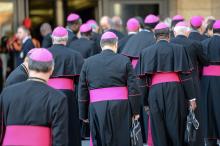
As the bishops gather in Baltimore this week for their annual meeting, they like everyone else in the country will be talking about last week’s election. The U.S. Catholic bishops took a beating at the polls. Not only was President Obama reelected, despite their attacks on him, the bishops also lost on state referendums on same-sex marriage.
Like all Americans, the bishops have a constitutional right to participate in the political process. They can debate the issues, criticize candidates and publicly express their views. They can even endorse candidates as long as they don’t do it on church property and don’t use church funds in supporting a candidate or party. In fact, they can even run for president as did Rev. Pat Robertson and Rev. Jesse Jackson. The U.S. Constitution does not forbid this; Roman Catholic canon law forbids it.
But what is constitutional is not always effective or prudent. Clearly the political strategy of the bishops is not working. A majority of Catholics voted for Obama and gay activists won every referendum. The Missouri and Indiana Republican senatorial candidates, who took the toughest positions on abortion, were also defeated when the Republicans were expected to win these races.
So where do the bishops go from here?
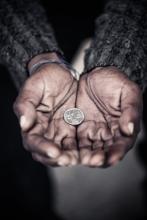
More American Catholics believe their religious leaders should be focused on issues related to poverty and social justice during this election season, rather than spending time and energy on other issues such as abortion, according to a new survey released this week by the Public Religion Research Institute.
The results of the 2012 American Values Survey demonstrate that American Catcholics -- and the "Catholic vote" -- is far from the monolith some politicians might like to believe they are.
"The survey confirms that there is no such thing as the 'Catholic vote,'" Robert P. Jones, CEO of PPRI and co-author of the report, told Reuters. "There are a number of critical divisions among Catholics, including an important divide between 'social justice' and "right to life' Catholics."
For instance, on the question of the public engagement of the church, the 2012 American Values Survey found important divisions between Catholics who prefer a “social justice” emphasis that focuses on helping the poor and Catholics who prefer a “right to life” emphasis that focuses on issues such as abortion.
The U.S. Catholic bishops' point man on sexual abuse has said that the hierarchy's credibility on fixing the problem is "shredded" and that the situation is comparable to the Reformation, when “the episcopacy, the regular clergy, even the papacy were discredited.”
Bishop R. Daniel Conlon of Joliet, Ill., last month told a conference of staffers who oversee child safety programs in American dioceses that he had always assumed that consistently implementing the bishops’ policies on child protection, “coupled with some decent publicity, would turn public opinion around.”
A new poll shows that American Catholics tend to agree with their bishops’ concerns that religious liberties are at risk in the U.S.
Nevertheless, Catholics seem to be warming to President Obama, even as the bishops lambaste his administration in their fight to roll back a federal mandate that requires employers — with some exceptions — to cover birth control in their health plans.
The poll, released on Aug. 1 by the Pew Forum on Religion & Public Life as the contraception mandate took effect, found that among Catholics who are aware of the bishops' protests, 56 percent say they agree with the bishops’ concerns, as opposed to 36 percent who disagree.
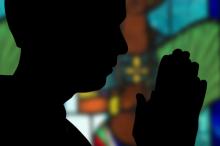
Amid continuing headlines about cover-ups of child abuse in the Catholic Church, an oversight board of lay Catholics on June 13 warned the nation’s bishops that they must follow their own policies against abuse more rigorously if they hope to restore their fragile credibility.
“If there is anything that needs to be disclosed in a diocese, it needs to be disclosed now,” Al J. Notzon III, head of the bishops’ National Review Board, told some 200 prelates gathered in Atlanta for their annual spring meeting. “No one can no longer claim they didn’t know.”
The meeting of the U.S. Conference of Catholic Bishops comes 10 years after the hierarchy met in Dallas and passed a series of reforms to respond to a siege of bad publicity about sex abuse by priests. It also comes as a jury in Philadelphia weighs the fate of a high-ranking priest who's facing criminal charges of concealing abuse by clerics, and as a bishop from Missouri awaits trial on charges that he failed to report a suspected child molester to authorities.

Leaders of an umbrella group that represents the majority of U.S. nuns met with top Vatican doctrinal officials on June 12 in an atmosphere of “openness and cordiality,” according to a Vatican statement.
Still, the Vatican made clear that the Leadership Conference of Women Religious — which represents most of America's 57,000 nuns — "remains under the supreme direction of the Holy See" and appeared to offer little wiggle room in its crackdown on the nuns' leaders.
The meeting was called after the Vatican's doctrinal watchdog office, the Congregation for the Doctrine of the Faith, issued a "doctrinal assessment" this spring that criticized the LCWR for not speaking out strongly enough against gay marriage, women priests and abortion.
A group of Episcopal bishops is asking President Obama to help assure that a United Nations agency continues to support a diocese-run hospital in the Gaza Strip.
In a June 6 letter, the 102 bishops ask the president to support funding for Al Ahli Hospital from the United Nations Relief and Works Agency for Palestine Refugees. The letter asserts funding was cut off in May, though an UNRWA official said a final decision has not been made.
The hospital, run by the Episcopal Diocese of Jerusalem, “is the only facility of its sort in the Gaza Strip that is not run by the Hamas government and as such, it is able to provide care without any outside interference or political calculation,” the letter states.

Leaders representing most of the nation’s 57,000 Catholic nuns on Friday (June 1) answered a Vatican crackdown on their group by charging that Rome’s criticisms of the sisters were “unsubstantiated,” caused “scandal and pain” and “greater polarization” in the church.
“Moreover, the sanctions imposed were disproportionate to the concerns raised and could compromise their ability to fulfill their mission,” the 22-member board of the Leadership Conference of Women Religious warned in a statement issued after a special four-day meeting in Washington.
The LCWR board meeting followed the surprise announcement in April that Pope Benedict XVI wanted a Vatican-led makeover of the group on the grounds that it was not speaking out strongly enough against gay marriage, abortion and women’s ordination.
Rome also chided the LCWR for doctrinal ambiguity and sponsoring conferences that featured “a prevalence of certain radical feminist themes incompatible with the Catholic faith.”
The unexpectedly strong pushback to the Vatican may be an indication of how much backlash the campaign has sparked among Catholics, who value the sisters’ longstanding ministry in education, health care and social services, and who bristle at Rome's demands to focus instead on sexual morality and enforcing orthodoxy.
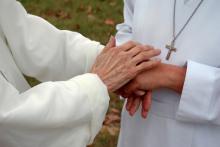
The crowd in an Atlanta church on Wednesday night was mostly Protestants, mostly preachers.
The speaker was a professor of preaching at Union Theological Seminary in New York City – one of the icons of the mainstream Protestant world.
Yet Barbara Lundblad’s message was a call for the 1,000 or so people gathered for the annual Festival of Homiletics to “stand with these courageous Roman Catholic sisters.”
She was referring, of course, to the recent crackdown by the Vatican on the Leadership Conference of Women Religious, the organization that represents about 80 percent of the nuns in the U.S.
Lundblad drew on the famous story of Mary, having just learned she was pregnant with Jesus, visiting her cousin, Elizabeth, who was also improbably pregnant.
The Gospel of Luke says that Mary “entered the house of Zechariah and visited Elizabeth.” Lundblad pondered why Luke felt it necessary to put Zechariah in the story at this point. She let that hang unanswered.
Then she noted that when Elizabeth saw Mary, the baby leapt in her womb in recognition of Jesus – a sign that women often come to theology through the experiences of their bodies.
Lundblad said wryly, “Surely Elizabeth would not have been allowed to testify before the Congressional committee on contraception” – an all-male committee with all male witnesses, all representing church groups that do not allow the ordination of women.